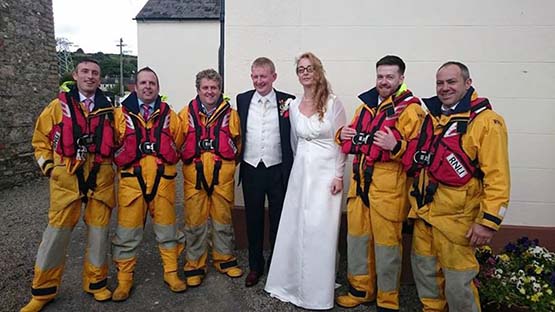Achill Island RNLI crew joined in the celebrations as long serving crew member Alan Gielty wed wife Maeve Clancy last weekend.
The crew kitted out in full lifeboat gear outside St Kevin’s Church in Wicklow to give Alan who has been on the lifeboat crew for 15 years, and his new wife Maeve, a special guard of honour.
Alan met Maeve in the local Clew Bay Pub and Restaurant which he owns and runs on Achill Island.
The couple were married in Maeve’s home village of Hollywood and guests gathered afterwards in the Mount Wolseley Hotel in Carlow for the wedding reception.
One of the day’s highlights was an epic best man’s speech which was delivered in song with the mandolin for accompaniment, by Alan’s brother Diarmuid.
During the eight minute long tribute which had guests roaring with laughter, Alan’s dedication to Achill Island RNLI got a mention: ‘There’s still an old flame in Alan’s heart so true. And when he gets the call poor Maeve you know he’ll leave you. Regardless of what you are doing he’ll drop tools and leave you be, and hop out on the lifeboat to save someone at sea.’
On behalf of Achill Island RNLI, Lifeboat Operations Manager Tom Honeyman said: ‘Alan joined the crew here in Achill in 2002 and has been a dedicated member at our lifeboat station ever since. He is a qualified crew member, first-aider, and navigator and is also a trainee Coxswain. We are delighted that he has found happiness with Maeve and we wish them the very best for their future.’































































